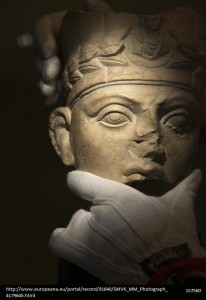The issue of lost cultures or cultures under threat is nowadays more urgent than ever. Increasingly more archaeological sites are set as targets of terrorist attacks, leading to their severe damage or even th eir total destruction. Such numerous examples documented in recent times call for action.
eir total destruction. Such numerous examples documented in recent times call for action.
In the aftermath of these attacks, individuals or groups, spontaneously or more organized, were activated having as goal to preserve or reconstruct as much as possible of the threatened heritage. In this way, several – mainly crowdsourcing – projects made their appearance in the Web calling people and institutions to contribute in order to virtually rebuild the sites damaged or destroyed. Among the endangered sites recently declared as targets of terrorism are Palmyra, Mosul and Nineveh.
In a different angle, with the aim of spreading the word and knowledge on these sites, the topic of Lost Cultures was set as the theme of two new knowledge testing games. Created in the context of the project ARK4 and in collaboration with Europeana Research, these games constitute an initiative of the Digital Curation Unit, Athena RC, project partner of both Europeana Research and ARK4. Adding to a series of knowledge testing games initiated with a Children’s Literature quiz, these games attempted to reuse digital content from the Cultural Heritage field, and in particular Europeana, to reach a wider audience.
The first game entitled “Lost cultures 1: Nineveh of Henry Layard” focuses on the ancient sites of Nineveh and Nimrud, excavated by Austen Henry Layard in the 19th century. The second game (Lost Cultures 2), which reuses digital content entirely deriving from Europeana, focuses on the ancient site of Palmyra. Since its destruction, the ancient city of Palmyra in Syria has been a popular topic among archaeologists and the public and has been reconstructed in various ways, from crowdsourcing projects to 3D virtual modeling initiatives. These games, which have been widely circulated in social media, could be considered as another effort to preserve the memory of the sites of Palmyra and Nineveh.
For those of you who did not have the chance to visit those sites or for the lucky ones who did, give a try to these knowledge testing games and have a glimpse of these important heritage sites.
– See more at: http://research.europeana.eu/blogpost/lost-cultures-within-europeana#sthash.7gLjWyR8.co4fN0M4.dpuf
By Eliza Papaki
Alexandra Angeletaki is a classical archaeologist and has worked as a lecturer in archeology at NTNU since2001. For the last few years she has been involved in innovative dissemination DH projects and has worked with Museology and Digital Learning at NTNU University Library.
She is also responsible for library seminars and academic writing support for students in Kalvskinnet Campus.